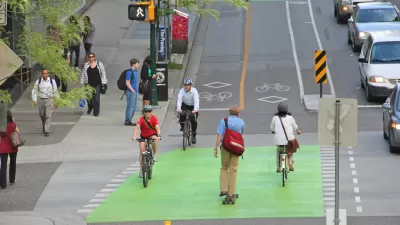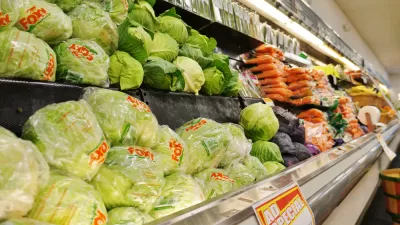Costco may be coming to Manhattan, bringing 2300 parking spaces with it.
Costco may be coming to Manhattan, bringing 2300 parking spaces with it.
In a city where high rents have driven out traditional grocery stores, some are welcoming the news. But is Costco the answer? Their buy-in-bulk business model is meant for big cars and big suburban homes. I don't see how this fits into Manhattan's car-free lifestyle, even if Costco modifies their building design for the urban landscape.
The role of neighborhood grocery stores in building and maintaining walkable communities cannot be overstated. European cities and towns simply would not be the pedestrian utopias that they are without the many small grocers, outdoor markets and specialty shops that make it possible to gather daily provisions without a car.
Small grocers are essential because:
• They fit well into walkable main streets.
• They are small enough to be located within residential communities.
• They don't require a huge parking lot
• They are close enough to housing so that shoppers can carry groceries home, or return several times a day if needed.
Can a neighborhood be considered mixed-use without a decent grocery store? And by decent, I am thinking of businesses that offer a basic variety of fresh, quality products at reasonable prices: Trader Joe's, Wild Oats, a trusted mom & pop grocer, or a local natural foods shop. Mid-sized grocery stores can also work well, provided that they are properly integrated into a city's shopping streets.
It's a common theme throughout suburban and even urban America: few residential neighborhoods are self sufficient when it comes to groceries. The ones that are lucky enough to have the "good stores" attract a lot of traffic from surrounding areas. The small grocery chain Fresh & Easy, subsidiary of the British Tesco empire, continues to expand in the southwestern United States. If the company targets locations that match the scale of its stores and have a walkable street grid, their venture could prove successful as the country trends away from suburban living.

Planetizen Federal Action Tracker
A weekly monitor of how Trump’s orders and actions are impacting planners and planning in America.

Maui's Vacation Rental Debate Turns Ugly
Verbal attacks, misinformation campaigns and fistfights plague a high-stakes debate to convert thousands of vacation rentals into long-term housing.

San Francisco Suspends Traffic Calming Amidst Record Deaths
Citing “a challenging fiscal landscape,” the city will cease the program on the heels of 42 traffic deaths, including 24 pedestrians.

Amtrak Rolls Out New Orleans to Alabama “Mardi Gras” Train
The new service will operate morning and evening departures between Mobile and New Orleans.

The Subversive Car-Free Guide to Trump's Great American Road Trip
Car-free ways to access Chicagoland’s best tourist attractions.

San Antonio and Austin are Fusing Into one Massive Megaregion
The region spanning the two central Texas cities is growing fast, posing challenges for local infrastructure and water supplies.
Urban Design for Planners 1: Software Tools
This six-course series explores essential urban design concepts using open source software and equips planners with the tools they need to participate fully in the urban design process.
Planning for Universal Design
Learn the tools for implementing Universal Design in planning regulations.
Heyer Gruel & Associates PA
JM Goldson LLC
Custer County Colorado
City of Camden Redevelopment Agency
City of Astoria
Transportation Research & Education Center (TREC) at Portland State University
Jefferson Parish Government
Camden Redevelopment Agency
City of Claremont





























